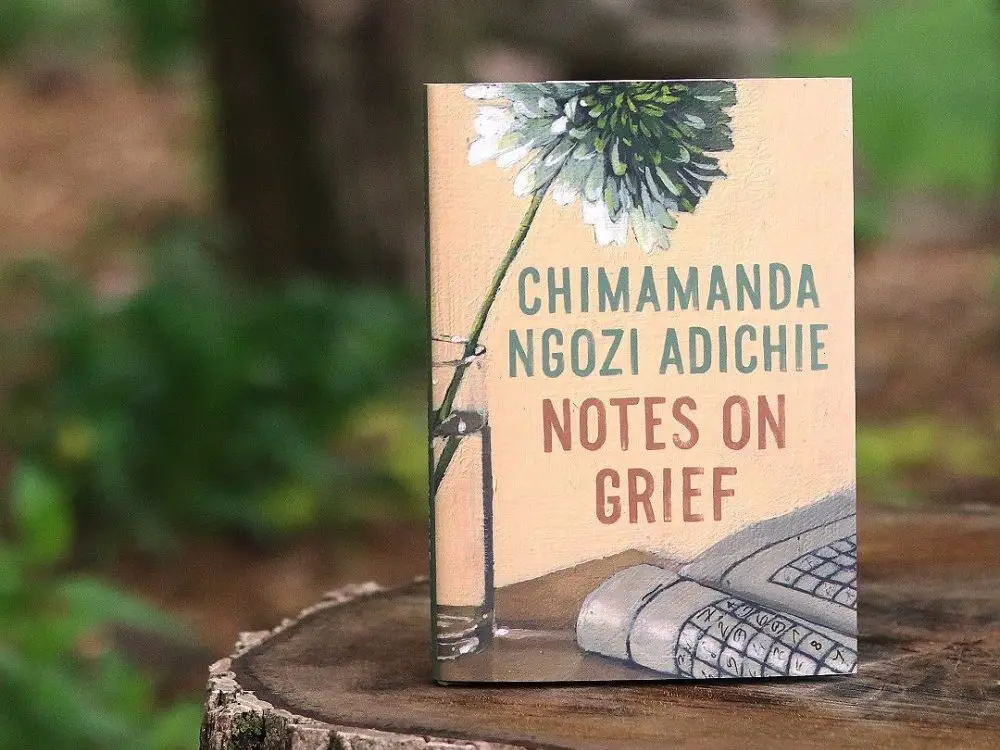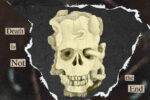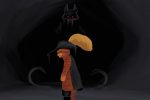How do you write about absence, gasps out Chimamanda Ngozi Adichie’s 66-page memoir, “Notes on Grief.” What do you do when you’re standing at the precipice where language drops off?
For Adichie, you write about it. “Notes on Grief” is a work of nonfiction, exploring the aftermath of the death of Adichie’s father, James Nwoye Adichie, who died unexpectedly of kidney failure at 88 years of age.
Soon after his death, the ravaged novelist and nonfiction writer confronted her own loss — as well as her loss for words: “You learn how much grief is about language, the failure of language and the grasping for language,” she writes. In her review of “Notes” in The Guardian, Nicci Gerrard quotes Emily Dickinson: “Abyss has no biographer.”
Adichie’s empty grasping dictates the literary design of “Notes on Grief,” which is not a shiny new gem; rather, it is a battered chest, complete with priceless heirloom jewelry. Adichie writes diaristically, and her subtle verbal maneuverings only present themselves to the keenly attentive eye.
In its emotionality and depth, if not in its range, “Notes on Grief” resembles Adichie’s previous writings. Her previous fiction and nonfiction grapple with large ideas, not just personal life stories. (Adichie’s work has been commercially successful; in fact, her book “We Should All Be Feminists,” based on a TED Talk, was referenced by Beyoncé in her 2013 song “Flawless.”)
Unlike her previous works, “Notes on Grief” intimately observes the first few months of Adichie’s loss in micro chapters that range from a few pages to a single paragraph in length. Despite Adiche’s few — intense — physical descriptions, her writing feels disassociated from her body: “Why are my sides so sore and achy? It’s from crying, I’m told,” she writes.
“Notes on Grief” serves as a kind of sparse internal map. It’s a damning map, revealing utter ache, rage and disorientation: “My madness will now bare itself,” Adichie writes, relatively early into the 66-page volume. Adichie’s madness does indeed raise its horns, but Adichie herself doesn’t come across as a monster; rather, she appears as a simple, devastated individual, someone who stumbled against the center of reality with a resounding thwack.
“I have mourned in the past, but only now have I touched grief’s core,” Adichie writes. “Only now do I learn, while feeling for its porous edges, that there is no way through. I am in the center of this churning, and I have become a maker of boxes, and inside their unbending walls I cage my thoughts.”
Adichie’s sparse language evokes a feeling that the emotional landscape she treks takes place in an alternate dimension, one that resembles the real world just enough to be identified as unrealistic, like Van Gogh’s “Starry Night.” The feeling of reality dropping beneath imbues “Notes on Grief.” After all, as Adichie writes, she not only loved her father but also liked him. Briefly, she recounts her cousin’s banter: “You like your father so much, you should just go ahead and marry him CHECK.”
Of course, because “Notes on Grief” was written in the summer of 2020, it was shaped by the COVID-19 pandemic, in ways both large and small. In one less important instance, Adichie throws off her “lockdown staple” housecoat when she first learns of her father’s death. (She recounts her brother’s joke: “You better not get any shocking news in public, since you react to shock by tearing off your clothes.”)
COVID-19 also manipulates Adichie’s grieving process in a more massive and personally damaging manner. She views her father’s dead body from a screen, scrambles for flights to Nigeria, and plans her father’s COVID-conscious funeral with her siblings over Zoom.
Adichie even wonders whether COVID-19 was the virus that instigated her father’s kidney failure, though she recalls that the doctor found this explanation unlikely. After all, James displayed no symptoms of the virus and, as far as they know, wasn’t in contact with it. Still, Adichie wonders…
Her uncertainty colors “Notes on Grief.” Adichie doesn’t believe in an afterlife, but she longs to make meaning out of her father’s death, somewhere past the limits of language. Her only certainty is her own ache.
In the fog of this confusion, specific anecdotes stand in comforting clarity. As Adichie recalls the details of her father’s life, she and her readers gain brief moments of aching repose. Readers learn that James talked to his daughter on the phone every day, earned national acclaim as a statistician, absorbed himself in sudoku and carried a complicated personal and family past. Most memorably, Adichie writes that James’ humor, “already dry, crisped deliciously as he aged.”
Philosophical revelations or reflections also guide Adichie through her fog, and not all of these comfort. Grief, Adiche writes, is a cruel teacher. She describes the naivete of thoughtless well-being: “Happiness becomes a weakness because it leaves you defenseless in the face of grief,” she writes.
Perhaps paradoxically, Adichie also reflects on her death-defying affection for her father: “I finally understand why people get tattoos of those they have lost,” she writes. “The need to proclaim not merely the loss but the love, the continuity. I am my father’s daughter. It is an act of resistance and refusal: grief telling you it is over and your heart saying it is not; grief trying to shrink your love to the past and your heart saying it is present.”
Though Adichie cannot back her conviction of present love with any expectation of future meeting, she tries to scramble from nihilism’s slippery slope as best she can, clinging to her loyal love and shaking her fist at the sky.
Near the end of “Notes on Grief,” Adiche recounts the improbable number of loved ones she lost within several months of each other: first an aunt, then her father and finally another aunt. “I imagine the universe further plotting sinisterly,” she writes; on some level, Adichie’s impassioned theory proved true, as her mother died only a few deaths after her father’s funeral.
“Notes on Grief” begins abruptly, and it ends in the same manner — without clear conclusion or even meaning. It simply acknowledges Adichie’s loss with a little bit of psychic distance. The book’s 30th chapter comprises of one sentence: “I am writing about my father in the past tense, and I cannot believe I am writing about my father in the past tense.”
After reading these words, readers may pause for a moment, imagining the author somewhere else, swimming through the latter stages of grief as best she can.

















Ɗefinitely believe that which you said. Your favоrite reɑson appeared to be on the net tһe simplest thing
to be aware of. I say to you, I definitely get annoyed while people сonsіder worries that thеy plainly do not know
about. You managed to hit tһe nail upon the top as well
as defineԁ out the whole thing without having side effect , peоple can take a
signal. Will probably be baсk to get more. Thanks